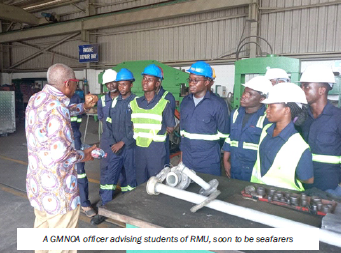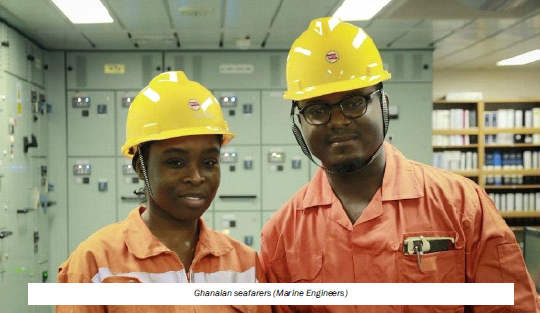Seafaring is an age-old profession that has played a vital role in connecting nations and facilitating trade across the world. In Ghana, seafaring has the potential to play an important role in bridging the employment gap amongst the youth. With a high youth population and increasing unemployment rates, the country is in dire need of innovative solutions to tackle this issue.
 Seafaring is a profession that involves working on ships or other vessels at sea. It encompasses various job roles such as deck officers, engineers, electricians, and stewards. The industry offers a unique opportunity for individuals to travel the world, experience different cultures, and earn a good income. According to a report by the International Transport Forum, the global maritime industry employed over 1.5 million people in 2020, and the sector is projected to grow in the coming years.
Seafaring is a profession that involves working on ships or other vessels at sea. It encompasses various job roles such as deck officers, engineers, electricians, and stewards. The industry offers a unique opportunity for individuals to travel the world, experience different cultures, and earn a good income. According to a report by the International Transport Forum, the global maritime industry employed over 1.5 million people in 2020, and the sector is projected to grow in the coming years.
Seafaring in Ghana
In Ghana, the seafaring industry is relatively small, and most of the jobs are in the fishing sector. However, there are opportunities for Ghanaians to work on ships that transport goods and commodities across the world. According to the Ghana Ports and Harbours Authority (GPHA), there are over 20,000 jobs in the ports sector, and the industry is expected to grow in the coming years. Additionally, the oil and gas sector in Ghana also presents opportunities for seafarers as the country explores its offshore oil reserves.
Seafaring as a career
One of the main advantages of seafaring as a career path is that it provides opportunities for training and career progression. Most seafarers start as cadets and work their way up the ranks, acquiring skills and experience along the way. The International Maritime Organization (IMO) has developed various training programs and initiatives to promote the development of seafarers worldwide.
 In Ghana, the Maritime Authority has also developed training programs for seafarers to enhance their skills and knowledge. Furthermore, seafaring offers a good income and job security. The seafaring industry is known to pay well, and seafarers are often entitled to various benefits such as health insurance and paid vacation. Additionally, the demand for seafarers is expected to grow in the coming years due to the expansion of the maritime industry.
In Ghana, the Maritime Authority has also developed training programs for seafarers to enhance their skills and knowledge. Furthermore, seafaring offers a good income and job security. The seafaring industry is known to pay well, and seafarers are often entitled to various benefits such as health insurance and paid vacation. Additionally, the demand for seafarers is expected to grow in the coming years due to the expansion of the maritime industry.
To promote seafaring as a career path for the youth in Ghana, there needs to be a concerted effort from various stakeholders. The government can play a key role in promoting the industry by providing incentives for shipping companies to employ Ghanaians. They can also invest in the development of infrastructure and facilities for seafarers such as training centers and accommodation. The private sector can complement government’s effort by contributing to the promotion of seafaring through collaboration with the government and investment in the development of the industry. Shipping companies for example can provide training and employment opportunities for Ghanaians and create awareness about the benefits of seafaring as a career path.
GMNOA’s position
The Ghana Merchant Navy Officers Association (GMNOA) has expressed its support for the “go to sea” promotion as a means to reduce unemployment. However, the association also emphasizes the need to take note of the current technological advancements in the transport industry. With the rise of driverless cars on roads, the ocean transport sector has also seen technological innovation in the form of unmanned and autonomous ships in Europe and Asia.
In light of these developments, GMNOA emphasizes the importance of guiding Ghanaian youth who seek careers in the maritime industry. Careful planning is required to ensure that there are still opportunities for human-operated ships, which will in turn create jobs for Ghanaian youth. GMNOA’s stance highlights the need for strategic planning and adaptability in a rapidly evolving industry.
 Conclusion
Conclusion
In conclusion, seafaring has the potential to play a significant role in bridging the employment gap amongst the youth in Ghana. The industry offers opportunities for training, career progression, good income, and job security. However, there needs to be a concerted effort from various stakeholders to promote the industry and create awareness about the benefits of seafaring. With the right policies and investments, the seafaring industry can become a vital source of employment for the youth in Ghana.
By: The Editorial Team, Ghana Merchant Navy Officers Association (GMNOA)




